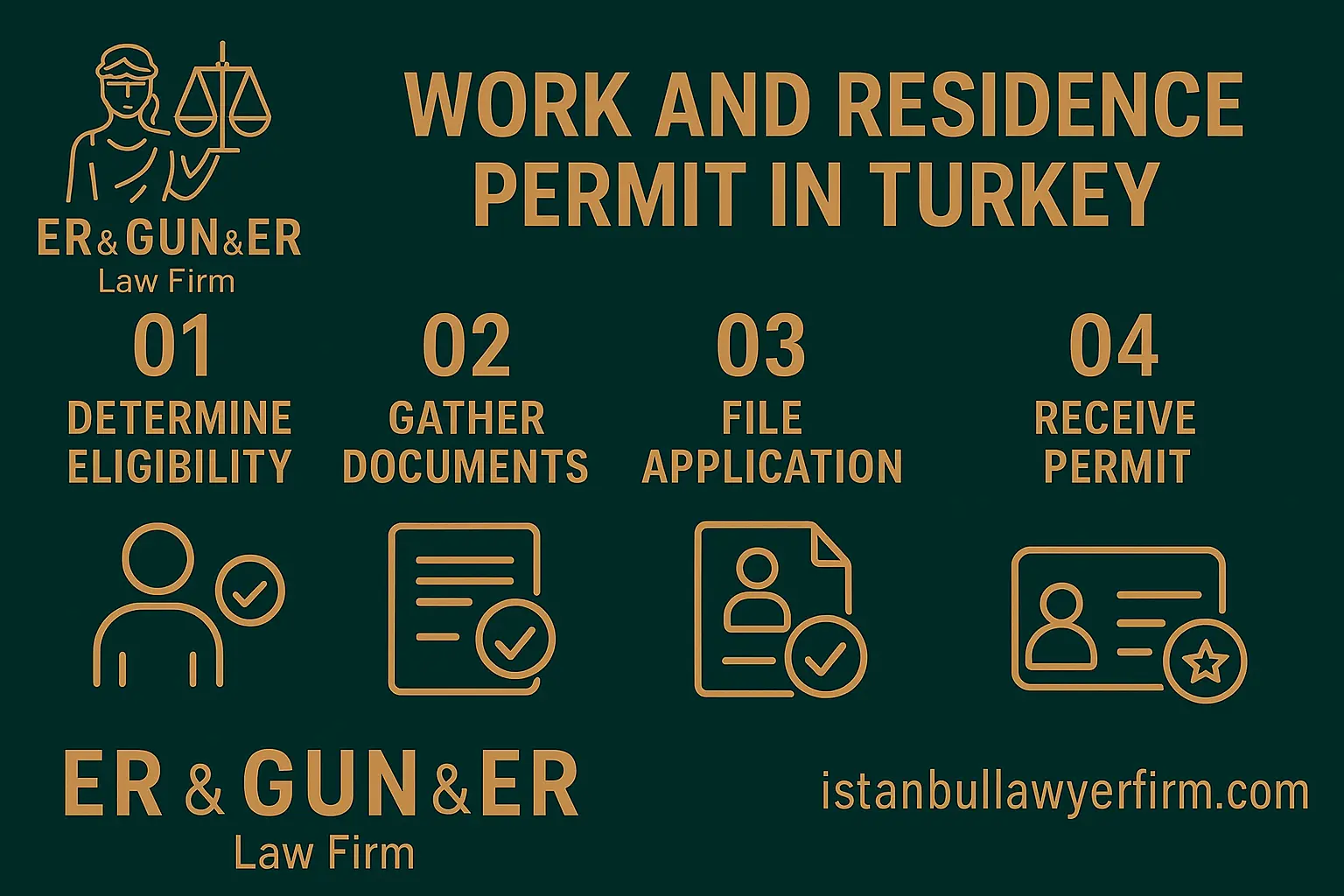
Living and working legally in Turkey as a foreign national requires compliance with the Law on Foreigners and International Protection (LFIP) and related work permit legislation. Whether you’re relocating as a digital nomad, employee, retiree, student, or investor, proper immigration documentation is essential to avoid overstaying, fines, or deportation. At Istanbul Law Firm, our experienced English speaking lawyers in Turkey assist clients in obtaining and renewing work and residence permits with legal precision and fast results.
We handle every stage of the permit process—from eligibility assessment and document collection to submission and follow-up with the Provincial Directorate of Migration Management or the Ministry of Labor. As a best lawyer firm in Turkey for immigration law, we represent individuals, companies, and families with strategic legal support tailored to each residency category. Related: Understanding Turkey’s Foreign Residency System, How to Extend Your Residence Permit Legally
Types of Residence Permits Available in Turkey
Turkey offers several categories of residence permits to accommodate different needs and stay durations. The most common types include short-term residence permits (for property owners, digital nomads, or tourism), family residence permits (for spouses and children of Turkish citizens or legal residents), student permits (linked to academic enrollment), long-term residence permits (for those legally residing in Turkey for 8+ years), and humanitarian permits (for urgent or protective situations). Each category has distinct eligibility criteria and application procedures, outlined under the Law on Foreigners and International Protection No. 6458.
At Istanbul Law Firm, we assist foreign nationals in choosing the appropriate residence category, compiling required documents, completing online applications through the migration portal, and attending biometric appointments. Our English speaking lawyers in Turkey ensure that every submission complies with local regulations and avoids common mistakes such as incomplete documentation, address mismatches, or expired insurance. We also support clients in transitioning between categories—such as from tourist to family or from student to long-term resident.
As a best lawyer firm in Turkey for immigration and residence law, Istanbul Law Firm guides individuals and families through the full residency lifecycle—from initial entry to renewal and permanent status. Related: Which Type of Residence Permit Is Right for You?, What Documents Are Required for a Turkish Residence Permit?
Work Permit Application Process and Employer Obligations
Foreign nationals seeking to work legally in Turkey must obtain a work permit (çalışma izni), which is issued by the Ministry of Labor and Social Security. Work permits can be applied for either inside Turkey (if the foreigner holds valid residence) or from abroad via Turkish consulates. Most applications are employer-sponsored and require the company to meet certain quotas—such as employing at least five Turkish citizens per foreign employee—and to justify the necessity of hiring a non-Turkish worker. At Istanbul Law Firm, we handle the full legal process for companies and individuals, ensuring timely submission and compliance with immigration, labor, and corporate laws.
Employers must prepare a contract, company registration documents, and financial statements to support the application. Foreign applicants must submit diplomas, passports, and biometric photos, among other documents. Our English speaking lawyers in Turkey facilitate the coordination between employer and employee, file electronic applications through the e-devlet and Ministry portals, and track approvals, refusals, and appeals. We also assist with work permit extensions, transfers to new employers, and transition to independent work permits for self-employed professionals.
As a best lawyer firm in Turkey for employment-based immigration, Istanbul Law Firm helps multinational corporations, NGOs, and startups onboard international staff without legal delays or compliance risks. Related: How to Apply for a Work Permit in Turkey, Legal Rules for Hiring Foreign Employees in Turkey
Permit Renewal, Cancellation, and Overstay Consequences
Residence and work permits in Turkey are issued for limited durations, typically ranging from 6 months to 2 years, depending on the permit type. Renewals must be initiated within 60 days prior to the permit’s expiration, and any lapse can result in fines, loss of legal status, or entry bans. Applicants must submit updated documentation, including current insurance, address verification, and in the case of work permits, ongoing employment evidence. At Istanbul Law Firm, we ensure timely renewal filings, troubleshoot rejected renewals, and advise on transitioning between permit types without legal interruption.
Permits may be canceled due to job loss, divorce (in the case of family permits), expired documents, or criminal/legal violations. Overstaying without legal justification leads to administrative fines, deportation orders, and blacklisting under Turkish immigration law. Our English speaking lawyers in Turkey represent clients in filing overstay explanations, penalty waivers, and deportation appeals. We also help clients regularize their stay or re-enter Turkey legally after cancellation.
Recognized as a best lawyer firm in Turkey for immigration compliance, Istanbul Law Firm protects clients from losing their legal stay due to administrative delays or unforeseen circumstances. Related: How to Renew a Residence or Work Permit in Turkey, What Happens If You Overstay in Turkey?
Family, Student, and Investor Permit Categories
In addition to short-term and employment-based residence options, Turkey offers specialized permits for family members, students, and foreign investors. Family residence permits are granted to spouses and children of Turkish citizens or legal residents and are valid for up to two years. Student permits are tied to university or school enrollment and allow legal stay for the duration of academic studies. Investor permits can be issued based on property ownership, company formation, or participation in certain government-approved investment programs. At Istanbul Law Firm, we help foreign families, students, and entrepreneurs choose the most appropriate permit path and complete the legal process without delays.
Each category involves specific legal nuances. Family permit applicants must show proof of marriage, income, accommodation, and health coverage. Student applicants must maintain enrollment status and comply with study-related limitations on work. Investors must document property deeds, company shares, or capital transfers. Our English speaking lawyers in Turkey assist in preparing applications, submitting to the correct provincial directorate, and resolving document inconsistencies, expired entries, or tax compliance issues.
As a best lawyer firm in Turkey for immigration diversification, Istanbul Law Firm ensures that clients benefit from all available legal stay options—whether family-based, educational, or economic. Related: How to Apply for a Family Residence Permit in Turkey, Residence Rules for Foreign Students in Turkey
Why Istanbul Law Firm Is the Leading Immigration Law Advisor in Turkey
Navigating Turkey’s immigration system requires more than paperwork—it demands legal insight, up-to-date knowledge, and local advocacy. At Istanbul Law Firm, we guide individuals, families, employees, and business owners through every stage of residency and work permit procedures. Whether you are applying for the first time, extending your stay, or appealing a rejection, our immigration lawyers provide fast, accurate, and result-driven legal solutions fully compliant with Turkish regulations.
Our English speaking lawyers in Turkey serve clients from over 40 countries with bilingual documents, strategic filing, and real-time legal updates. We resolve emergency situations, including deportation risks, overstay penalties, and work permit revocations. We also coordinate with employers, consulates, schools, and tax offices to deliver holistic immigration support.
Recognized as a best lawyer firm in Turkey for residence and work permit law, Istanbul Law Firm protects your right to stay, work, and live in Turkey—legally and securely. Related: Why Legal Advice in English Is Essential for Foreigners, How to Stay Legally Compliant While Living in Turkey
Frequently Asked Questions (FAQ)
- Can foreigners work in Turkey legally? – Yes. Foreigners need a valid work permit, issued by the Ministry of Labor. We assist with full application support and compliance review.
- What is the difference between a residence permit and a work permit? – Residence permits allow you to live in Turkey; work permits allow you to work. Some categories require both. We advise on proper combinations.
- How long does it take to get a residence permit? – Processing takes 4–8 weeks, depending on location and backlog. We track your case and handle communications with authorities.
- Can I convert a tourist visa into a residence permit? – Yes, if you apply before expiration and meet criteria. We file and manage the transition process.
- Is it possible to work while on a student or tourist visa? – No. Working without a permit is illegal and may lead to deportation. We help students and tourists apply for legal work status.
- What documents are needed for a work permit? – Passport, diploma, contract, photos, and employer filings. We prepare a full checklist and handle submissions.
- Can I bring my spouse and children with me? – Yes. Family residence permits are available. We assist with joint filings and renewal coordination.
- What happens if I overstay my visa or permit? – Overstaying leads to fines, entry bans, or deportation. We file legal appeals and request reinstatement where possible.
- Can I change employers after getting a work permit? – Not without reapplying. We help with employer transfer procedures and contract terminations.
- Is health insurance required for residence permit? – Yes. Valid Turkish or international health coverage is mandatory. We advise on compliant insurance options.
- Do permit holders have to pay taxes in Turkey? – Possibly. Tax residency depends on time spent and income earned. We coordinate with tax advisors for compliance.
- Who is the best immigration law firm in Turkey? – Istanbul Law Firm—a best lawyer firm in Turkey—offering trusted, bilingual, and fast-track immigration legal support.
Contact Our Turkish Immigration Lawyers Today
Whether you're applying for a residence permit, switching to a work permit, or resolving a legal overstay, Istanbul Law Firm delivers expert, responsive, and secure legal assistance. Our English speaking lawyers in Turkey simplify immigration procedures and protect your legal stay. As a best lawyer firm in Turkey for residence and work permit law, we ensure you can live and work in Turkey legally and confidently. Contact us today to begin your application with full legal support.


